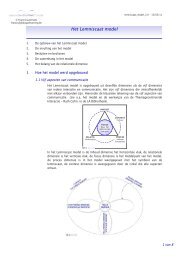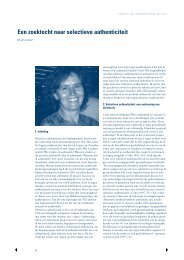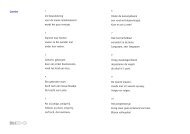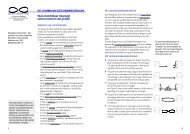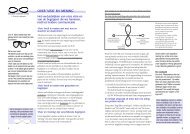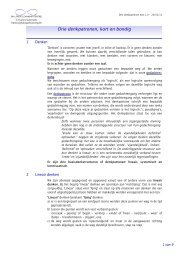The Meaning of Sunyata in Nagarjuna's Philosophy - Lemniscaat ...
The Meaning of Sunyata in Nagarjuna's Philosophy - Lemniscaat ...
The Meaning of Sunyata in Nagarjuna's Philosophy - Lemniscaat ...
You also want an ePaper? Increase the reach of your titles
YUMPU automatically turns print PDFs into web optimized ePapers that Google loves.
<strong>The</strong> <strong>Mean<strong>in</strong>g</strong> <strong>of</strong> <strong>Sunyata</strong> <strong>in</strong> <strong>Nagarjuna's</strong> <strong>Philosophy</strong><br />
© Thomas J. McFarlane 1995<br />
www.<strong>in</strong>tegralscience.org<br />
Introduction<br />
In this essay I will discuss the mean<strong>in</strong>g and import <strong>of</strong> sunyata (empt<strong>in</strong>ess) as it is<br />
presented by K. Venkata Ramanan <strong>in</strong> <strong>Nagarjuna's</strong> <strong>Philosophy</strong>. Ramanan's comprehensive<br />
exposition <strong>of</strong> the Madhyamika philosophy <strong>of</strong> Mahayana Buddhism is based primarily upon<br />
<strong>Nagarjuna's</strong> commentary on the Prajnaparamita-sutras. This commentary, the Mahaprajnaparamita-sastra,<br />
was lost <strong>in</strong> its orig<strong>in</strong>al Sanskrit and survives only <strong>in</strong> Ch<strong>in</strong>ese and<br />
Tibetan translation.<br />
Nagarjuna, who is regarded as the greatest Buddhist philosopher ever, founded<br />
Madhyamika philosophy, the philosophy <strong>of</strong> the Middle Way. At the heart <strong>of</strong> the Middle Way<br />
is the concept <strong>of</strong> sunyata, perhaps <strong>Nagarjuna's</strong> s<strong>in</strong>gle most important contribution to<br />
Buddhist thought. <strong>The</strong> whole philosophy, <strong>in</strong> fact, can be viewed as different aspects <strong>of</strong><br />
sunyata. As Ramanan says <strong>of</strong> his book, "the whole <strong>of</strong> the present work may be said to be an<br />
attempt to lay bare the different mean<strong>in</strong>gs <strong>of</strong> the central, the most basic concept, sunyata."<br />
Thus, I will attempt to br<strong>in</strong>g to light the mean<strong>in</strong>g and import <strong>of</strong> sunyata through the<br />
follow<strong>in</strong>g summary <strong>of</strong> <strong>Nagarjuna's</strong> <strong>Philosophy</strong>. For the purpose <strong>of</strong> clarity I have divided the<br />
follow<strong>in</strong>g exposition <strong>in</strong>to three parts: ignorance, criticism, and knowledge.<br />
Ignorance<br />
Motivated by compassion, the wise teach sunyata as a remedy for suffer<strong>in</strong>g. Accord<strong>in</strong>g to<br />
Madhyamika, the root <strong>of</strong> all suffer<strong>in</strong>g lies <strong>in</strong> the ignorance <strong>of</strong> cl<strong>in</strong>g<strong>in</strong>g, the error <strong>of</strong><br />
mistak<strong>in</strong>g the relative for the absolute, the conditioned for the unconditioned. We take<br />
imag<strong>in</strong>ed separation as real, supposed division as given. By virtue <strong>of</strong> self- consciousness,<br />
we have an awareness <strong>of</strong> the unconditioned reflected <strong>in</strong> our conditioned nature, a sense <strong>of</strong><br />
the real. But under ignorance we do not discrim<strong>in</strong>ate between the unconditioned and<br />
conditioned, caus<strong>in</strong>g us to confuse them and take the relative as absolute. "<strong>The</strong> error <strong>of</strong><br />
misplaced absoluteness, the seiz<strong>in</strong>g <strong>of</strong> the determ<strong>in</strong>ate as itself ultimate, is the root-error."<br />
<strong>Sunyata</strong> is the antithesis to this error, the antidote for suffer<strong>in</strong>g.<br />
<strong>The</strong> most important <strong>in</strong>stance <strong>of</strong> this error <strong>of</strong> misplaced absoluteness is with regard to our<br />
own selves: "<strong>The</strong> <strong>in</strong>tellect, ow<strong>in</strong>g to the operation <strong>of</strong> ignorance, wrongly transfers its sense<br />
<strong>of</strong> unconditionedness which is its ultimate nature to itself <strong>in</strong> its mundane nature." Thus,<br />
<strong>in</strong>herent existence is wrongly applied to the m<strong>in</strong>d-body complex; we take our determ<strong>in</strong>ate,<br />
conditioned existence as unconditioned and self-existent. In this way there arises the false<br />
sense <strong>of</strong> "I" and the belief <strong>in</strong> an eternal soul as a particular entity. This error "makes the<br />
<strong>in</strong>dividual unrelated to the organic, dynamic course <strong>of</strong> personal life and deprives the latter<br />
<strong>of</strong> all significance." For with the posit<strong>in</strong>g <strong>of</strong> an absolute "I" there is the necessary "not-I" to<br />
oppose it. <strong>The</strong> <strong>in</strong>dividual is then forever divided from and <strong>in</strong> conflict with the world. S<strong>in</strong>ce<br />
this separation is taken as absolute, their relation is <strong>in</strong>conceivable and there is no hope for<br />
reconciliation: we are bound to a life <strong>of</strong> cont<strong>in</strong>ual conflict and frustration.<br />
Follow<strong>in</strong>g the pattern <strong>of</strong> this error which gives rise to the false sense <strong>of</strong> "I," the <strong>in</strong>tellect<br />
then posits substantiality upon every object it f<strong>in</strong>ds. It dist<strong>in</strong>guishes objects and <strong>in</strong>vents<br />
1
dist<strong>in</strong>ct names for them, then takes the apparent difference it has created as a real given.<br />
"To seize the determ<strong>in</strong>ate is really to allow oneself to be misled by names; it is to imag<strong>in</strong>e<br />
that different names mean separate essences; this is to turn relative dist<strong>in</strong>ctions <strong>in</strong>to<br />
absolute divisions." As a result, not only is the <strong>in</strong>dividual person <strong>in</strong> conflict with the world,<br />
but the world is now <strong>in</strong> conflict with itself. <strong>The</strong> parts, conceived as <strong>in</strong>dependent entities, are<br />
isolated from each other and the organic unity that relates them <strong>in</strong> harmony is lost.<br />
To complete the fall, the <strong>in</strong>tellect mistakes its own relative views and conceptual systems as<br />
unlimited and absolute, putt<strong>in</strong>g it at war with itself. For the dogmatic assertion <strong>of</strong> a s<strong>in</strong>gle<br />
po<strong>in</strong>t <strong>of</strong> view necessarily excludes other views: the former as true is divided from the<br />
others as false and conflict results. Furthermore, every view, taken as exclusively true,<br />
ultimately ends <strong>in</strong> self-contradiction. Cl<strong>in</strong>g<strong>in</strong>g to extremes, one is necessarily led to<br />
contradictions and dead ends. <strong>The</strong>n we either sw<strong>in</strong>g from extreme to extreme or reject the<br />
whole enterprise <strong>of</strong> thought altogether, subject<strong>in</strong>g ourselves to self-exile <strong>in</strong> a philosophical<br />
wasteland. But <strong>in</strong> both cases we are lead to our suffer<strong>in</strong>g by the same root-error.<br />
<strong>The</strong> error <strong>of</strong> misplaced absoluteness which is the root <strong>of</strong> all ignorance and suffer<strong>in</strong>g takes<br />
two general forms: the error with regard to the mundane truth and with regard to the<br />
ultimate truth. <strong>The</strong> error with regard to the mundane truth is, as we have been discuss<strong>in</strong>g,<br />
to take the conditioned as unconditioned, to cl<strong>in</strong>g to the fragmentary as complete. This<br />
error results <strong>in</strong> (among other th<strong>in</strong>gs) dogmatic views and the false sense <strong>of</strong> self. <strong>Sunyata</strong>,<br />
as a remedy for this error with respect to the mundane, teaches the relativity <strong>of</strong> all th<strong>in</strong>gs,<br />
the dependent aris<strong>in</strong>g <strong>of</strong> determ<strong>in</strong>ate entities. As mundane truth, sunyata means that all<br />
th<strong>in</strong>gs are empty <strong>of</strong> <strong>in</strong>herent existence.<br />
But if one were to take this understand<strong>in</strong>g <strong>of</strong> the empt<strong>in</strong>ess <strong>of</strong> th<strong>in</strong>gs as itself absolute, this<br />
aga<strong>in</strong> would be cl<strong>in</strong>g<strong>in</strong>g: cl<strong>in</strong>g<strong>in</strong>g to sunyata. This mistake is the error not with regard to<br />
the mundane nature <strong>of</strong> th<strong>in</strong>gs but with regard to their ultimate nature. It is to take the<br />
conditionedness <strong>of</strong> the conditioned as itself unconditioned. But "this would mean an<br />
absolute division between the conditioned and the unconditioned, the divided and the<br />
undivided, the permanent and the impermanent, and <strong>in</strong> this case the undivided would not<br />
be the truly undivided, as it would be divided from the divided." Thus one teaches the<br />
sunyata <strong>of</strong> sunyata: <strong>in</strong> the ultimate truth even sunyata is empty <strong>of</strong> absoluteness. Ultimately,<br />
even the division between the conditioned and the unconditioned is not absolute. <strong>The</strong>refore<br />
we are not forever bound to our conditionedness because we, as conditioned entities,<br />
already are (<strong>in</strong> our ultimate nature) the unconditioned reality. In short, there is an end to<br />
ignorance and suffer<strong>in</strong>g.<br />
Criticism<br />
Madhyamika philosophy is conceived <strong>in</strong> compassion, for its fundamental purpose is to<br />
liberate <strong>in</strong>dividuals from ignorance and suffer<strong>in</strong>g. Through criticism one discrim<strong>in</strong>ates<br />
between the real and the unreal, cancels the confusion <strong>of</strong> the relative with the absolute,<br />
and ends ignorance and suffer<strong>in</strong>g through recognition <strong>of</strong> sunyata as truth. <strong>The</strong> sense <strong>of</strong> the<br />
real is the basis for this cancellation. Just as the sense <strong>of</strong> the real leads to ignorance when<br />
misapplied, the sense <strong>of</strong> the real leads to knowledge when guided by criticism <strong>in</strong> light <strong>of</strong><br />
sunyata. Without the sense <strong>of</strong> the real liberation would not be possible--but then neither<br />
would ignorance. Thus ignorance implies the possibility for liberation. "<strong>The</strong> truth that man<br />
is not conf<strong>in</strong>ed to the level <strong>of</strong> the determ<strong>in</strong>ate, but has <strong>in</strong> him the possibility <strong>of</strong> ris<strong>in</strong>g above<br />
it, that he is the meet<strong>in</strong>g po<strong>in</strong>t <strong>of</strong>. . .the conditioned and the unconditioned, is the basic<br />
import <strong>of</strong> the sense <strong>of</strong> the real <strong>in</strong> him."<br />
2
Criticism consists <strong>in</strong> first assum<strong>in</strong>g as absolute the dist<strong>in</strong>ctions and claims upon which a<br />
particular extreme view is based. From this basis one draws the necessary logical<br />
conclusions which turn out to be false because <strong>of</strong> the falsity <strong>of</strong> the <strong>in</strong>itial error. "<strong>The</strong> one<br />
way which Nagarjuna frequently adopted was <strong>of</strong> show<strong>in</strong>g up the self-contradiction and<br />
absurdity to which the holders <strong>of</strong> exclusive views would lead themselves on their own<br />
grounds." In this way, one is lead by the sheer force <strong>of</strong> logical truth to surrender the<br />
ignorance <strong>of</strong> the exclusive claim. By repeated application <strong>of</strong> this method, the relative is no<br />
longer mistaken for the absolute and the true sunya-nature <strong>of</strong> all <strong>of</strong> determ<strong>in</strong>ate existence<br />
is revealed. "It is the mission <strong>of</strong> the Madhyamika to reveal that the notion <strong>of</strong> the ultimacy<br />
and separateness <strong>of</strong> these basic elements is not only devoid <strong>of</strong> ground but is def<strong>in</strong>itely<br />
contradicted by the very nature <strong>of</strong> th<strong>in</strong>gs." <strong>Sunyata</strong>, as empt<strong>in</strong>ess, means that the<br />
conventional world is not, as we fancy to th<strong>in</strong>k, composed <strong>of</strong> substances <strong>in</strong>herently<br />
exist<strong>in</strong>g; <strong>in</strong> truth, these entities are devoid <strong>of</strong> <strong>in</strong>herent existence--they are empty.<br />
It is important to po<strong>in</strong>t out that what is denied by such criticism is not the conditioned<br />
world itself but our cl<strong>in</strong>g<strong>in</strong>g to it as absolute, our ignorance. Thus, it is not the views or<br />
determ<strong>in</strong>ate entities as such which are denied by sunyata but rather our cl<strong>in</strong>g<strong>in</strong>g to them,<br />
our misconceptions with regard to them. <strong>Sunyata</strong> does not deny the conditioned, relative<br />
world; it only denies our mistak<strong>in</strong>g it as absolute. "Words, concepts, are <strong>in</strong> themselves<br />
pure; what makes the difference is the way <strong>in</strong> which we use them." Furthermore, the<br />
conditioned world does not vanish when its true sunya-nature is realized. Only our<br />
ignorance is destroyed.<br />
As an example <strong>of</strong> the application <strong>of</strong> the critical method, let us consider the true nature <strong>of</strong><br />
the self. Our first error, it is said, "is the imag<strong>in</strong>ation <strong>of</strong> absolute exclusiveness <strong>in</strong> regard to<br />
the 'I,' i.e., the entity that constitutes the object <strong>of</strong> the notion <strong>of</strong> 'I.' " Now if I <strong>in</strong>herently<br />
exist, then there is an absolute division between that which is 'I' and that which is 'not-I.'<br />
<strong>The</strong>re is then no dependence <strong>of</strong> one upon the other. Each is <strong>in</strong>dependent and self-existent.<br />
But without mutual dependence how can 'I' be <strong>in</strong> any way related to 'not-I,' how can I know<br />
or be aware <strong>of</strong> the world at all? If I exist <strong>in</strong>herently, I am absolutely isolated and divided<br />
from the world with no possibility <strong>of</strong> experienc<strong>in</strong>g it or affect<strong>in</strong>g it. This is obviously<br />
absurd.<br />
By reveal<strong>in</strong>g the contradictions that arise <strong>in</strong> this way from tak<strong>in</strong>g the relative self as<br />
absolutely existent, we thus reveal the sunya-nature, the relative and conditioned nature,<br />
<strong>of</strong> the self. We have then arrived at the truth with respect to the conventional world: that all<br />
th<strong>in</strong>gs (<strong>in</strong> this case, the self) are empty <strong>of</strong> <strong>in</strong>herent existence. However, hav<strong>in</strong>g denied the<br />
<strong>in</strong>herent existence <strong>of</strong> the self, suppose we now cl<strong>in</strong>g to this denial as itself absolute. In<br />
other words, we assert <strong>in</strong>herent non-existence, we make empt<strong>in</strong>ess or relativity itself an<br />
absolute. Now <strong>in</strong> this case there is an absolute division between the relative and the<br />
absolute, the divided and the undivided. But then the undivided is not truly the undivided<br />
for it is divided from the divided. This contradiction forces us to surrender our cl<strong>in</strong>g<strong>in</strong>g to<br />
the conditionedness <strong>of</strong> the conditioned as itself absolute.<br />
At this po<strong>in</strong>t <strong>in</strong> the criticism we thus come to recognize that empt<strong>in</strong>ess, sunyata, is not the<br />
ultimate truth. While this conditionedness and relativity <strong>of</strong> the self is its true nature <strong>in</strong> the<br />
conventional world, it is not its ultimate nature. Ultimately, the self is empty even <strong>of</strong> its<br />
conditionedness and relativity: it is ultimately empty <strong>of</strong> empt<strong>in</strong>ess (sunyata-sunyata, as it is<br />
called). And s<strong>in</strong>ce the conditionedness <strong>of</strong> the conditioned is ultimately conditioned, s<strong>in</strong>ce<br />
the dist<strong>in</strong>ction between the conditioned and the unconditioned is itself conditioned, the<br />
conditioned is ultimately identical to the unconditioned reality.<br />
S<strong>in</strong>ce criticism has revealed contradictions <strong>in</strong> cl<strong>in</strong>g<strong>in</strong>g to both <strong>in</strong>herent existence and<br />
<strong>in</strong>herent non-existence, <strong>in</strong> the end we can neither absolutely assert nor absolutely deny the<br />
existence <strong>of</strong> the self. We are left with the Middle Way, pass<strong>in</strong>g between the extremes. "This<br />
3
is the unerr<strong>in</strong>g sense <strong>of</strong> 'I,' which comes with mature self-consciousness <strong>in</strong> which there is<br />
not the cl<strong>in</strong>g<strong>in</strong>g to the determ<strong>in</strong>ate self either as absolutely determ<strong>in</strong>ate and therefore<br />
totally different from the undivided be<strong>in</strong>g or as itself an eternal <strong>in</strong>dependent substance."<br />
<strong>The</strong> method <strong>of</strong> criticism thus functions to cancel all exclusive claims to existence or truth,<br />
whether with respect to the mundane nature <strong>of</strong> th<strong>in</strong>gs (tak<strong>in</strong>g the conditioned existence as<br />
unconditioned) or with respect to their ultimate nature (tak<strong>in</strong>g conditionedness <strong>of</strong> the<br />
conditioned as itself unconditioned).<br />
Knowledge<br />
"<strong>The</strong> understand<strong>in</strong>g that is the consummat<strong>in</strong>g phase <strong>of</strong> criticism is appreciative <strong>of</strong> the<br />
unique nature and value <strong>of</strong> every specific standpo<strong>in</strong>t, and yet is not conf<strong>in</strong>ed to any one<br />
po<strong>in</strong>t <strong>of</strong> view." <strong>The</strong> wise are thus said to have a comprehension <strong>of</strong> the truth which rises<br />
above exclusiveness and cl<strong>in</strong>g<strong>in</strong>g. "Transcend<strong>in</strong>g all determ<strong>in</strong>ations it is yet not exclusive<br />
<strong>of</strong> anyth<strong>in</strong>g determ<strong>in</strong>ate, and is therefore itself undeniable." To the wise, particular views<br />
and conceptual systems are not extremes but alternatives. Thus even Madhyamika itself<br />
can not be put forward as an absolute truth, exclusive <strong>of</strong> others. As the teach<strong>in</strong>g <strong>of</strong> noncl<strong>in</strong>g<strong>in</strong>g,<br />
the Middle Way is itself relative to the ignorance <strong>of</strong> cl<strong>in</strong>g<strong>in</strong>g. <strong>Sunyata</strong> makes sense<br />
only <strong>in</strong> contrast with the error <strong>of</strong> misplaced absoluteness. <strong>The</strong> undeniable, ultimate truth is<br />
the unspeakable dharma.<br />
S<strong>in</strong>ce the undivided reality is not ultimately divided from the divided, s<strong>in</strong>ce the ultimate<br />
nature <strong>of</strong> the conditioned is itself the unconditioned, the wise do not forsake the world,<br />
cl<strong>in</strong>g<strong>in</strong>g to nirvana as though it were other than samsara. <strong>The</strong>ir compassion is a necessary<br />
consequence <strong>of</strong> their wisdom. Conversely, if we seek liberation and truth exclusively for<br />
ourselves, then the selfish motivation itself, as a form <strong>of</strong> ignorance, will prevent our<br />
atta<strong>in</strong>ment <strong>of</strong> the highest truth. <strong>The</strong>refore the Bodhisattva vows from the very beg<strong>in</strong>n<strong>in</strong>g to<br />
atta<strong>in</strong> Nirvana for the sake <strong>of</strong> help<strong>in</strong>g release others from their suffer<strong>in</strong>g. Compassion and<br />
wisdom are <strong>in</strong>separable aspects <strong>of</strong> the highest comprehension <strong>of</strong> truth.<br />
Conclusion<br />
By way <strong>of</strong> summary, we may frame the philosophy <strong>of</strong> the Middle Way <strong>in</strong> the context <strong>of</strong> the<br />
Four Noble Truths.<br />
<strong>The</strong> First Noble Truth: there is suffer<strong>in</strong>g, the world is impermanent. In our terms, this truth<br />
expresses the mundane truth that all th<strong>in</strong>gs are empty <strong>of</strong> <strong>in</strong>herent existence, they are<br />
conditioned and relative. Because we cl<strong>in</strong>g to them as if they were permanent and<br />
substantial, suffer<strong>in</strong>g is the <strong>in</strong>evitable consequence.<br />
<strong>The</strong> Second Noble Truth: there is a cause <strong>of</strong> suffer<strong>in</strong>g. <strong>The</strong> cause <strong>of</strong> suffer<strong>in</strong>g is cl<strong>in</strong>g<strong>in</strong>g to<br />
the relative as absolute, the conditioned as unconditioned, the <strong>in</strong>substantial as substantial.<br />
<strong>The</strong> ignorance <strong>of</strong> the true empt<strong>in</strong>ess or sunya-nature <strong>of</strong> th<strong>in</strong>gs, the confusion <strong>of</strong> the real<br />
and unreal, is the root error that leads to all suffer<strong>in</strong>g.<br />
<strong>The</strong> Third Noble Truth: there is an end to suffer<strong>in</strong>g. Because even empt<strong>in</strong>ess is empty,<br />
because relativity and conditionedness themselves are not absolute, suffer<strong>in</strong>g is not<br />
ultimate. While the mundane nature <strong>of</strong> the conditioned is conditionedness, yet <strong>in</strong> its<br />
ultimate nature, the conditioned is itself the undivided, unconditioned reality. While the<br />
ultimate reality is beyond the dist<strong>in</strong>ctions that hold <strong>in</strong> the world <strong>of</strong> the determ<strong>in</strong>ate, yet the<br />
ultimate reality is not wholly separate from the determ<strong>in</strong>ate, but is the real nature <strong>of</strong> the<br />
determ<strong>in</strong>ate itself. It is because we already are identical to the unconditioned reality that we<br />
4
can recognize this truth and become liberated from the imag<strong>in</strong>ation that we are otherwise,<br />
and thereby end our suffer<strong>in</strong>g.<br />
<strong>The</strong> Fourth Noble Truth: there is a path that leads to the end <strong>of</strong> suffer<strong>in</strong>g. <strong>The</strong> Middle Way<br />
is the non-exclusive way that destroys the ignorance <strong>of</strong> cl<strong>in</strong>g<strong>in</strong>g to the relative as absolute.<br />
Through the method <strong>of</strong> criticism, extreme views are shown to lead to contradictions which<br />
reveal the truth <strong>of</strong> sunyata with regard to all th<strong>in</strong>gs. Ultimately, even sunyata or relativity<br />
itself is denied as absolute, reveal<strong>in</strong>g the unutterable unconditioned reality which is the<br />
ultimate nature <strong>of</strong> ourselves and all th<strong>in</strong>gs.<br />
Glossary<br />
• Absolute. <strong>The</strong> absolute is that which is free from all qualification and dist<strong>in</strong>ction. It is<br />
the ultimate <strong>in</strong>effable nature <strong>of</strong> all th<strong>in</strong>gs. S<strong>in</strong>ce it is free from the dist<strong>in</strong>ction between<br />
the knower and the known, to know the Absolute is to be the Absolute, and to ignore<br />
the Absolute is not to be the Absolute.<br />
• Conditioned. <strong>The</strong> conditioned is the world <strong>of</strong> th<strong>in</strong>gs that exist conditionally and<br />
dependently, and hence <strong>in</strong> relation to other th<strong>in</strong>gs. See Relative.<br />
• Conventional World. <strong>The</strong> dist<strong>in</strong>ctions that characterize the relative world are mere<br />
conventions. Thus the relative world is also called the conventional world. See<br />
Relative.<br />
• Determ<strong>in</strong>ate. <strong>The</strong> world <strong>of</strong> determ<strong>in</strong>ed th<strong>in</strong>gs. See Relative.<br />
• Empt<strong>in</strong>ess. See <strong>Sunyata</strong>.<br />
• Ignorance. In the context <strong>of</strong> Buddhist philosophy, ignorance is to ignore the true<br />
nature <strong>of</strong> th<strong>in</strong>gs. Rather than be<strong>in</strong>g the absence <strong>of</strong> knowledge, ignorance is an<br />
ignor<strong>in</strong>g <strong>of</strong> knowledge we already have. Ignorance is the orig<strong>in</strong>al mistake <strong>of</strong> tak<strong>in</strong>g<br />
th<strong>in</strong>gs to be other than what they are and then act<strong>in</strong>g on this false presumption. In<br />
particular, it is the mistake <strong>of</strong> misplac<strong>in</strong>g the absolute: tak<strong>in</strong>g th<strong>in</strong>gs <strong>in</strong> the relative<br />
world, which are by nature impermanent and dependent, to have the absolute<br />
properties <strong>of</strong> permanence and <strong>in</strong>dependence.<br />
• Indeterm<strong>in</strong>ate. That which is free <strong>of</strong> determ<strong>in</strong>ation. See Absolute.<br />
• Inherent Existence. We take someth<strong>in</strong>g to have <strong>in</strong>herent existence when we regard it<br />
as permanently and <strong>in</strong>dependently exist<strong>in</strong>g. Usually this presumption is tacit or<br />
unconscious. For example, we fear death because we presume that the self <strong>in</strong>herently<br />
exists <strong>in</strong> the first place. When it is recognized that there is no <strong>in</strong>herently exist<strong>in</strong>g self,<br />
then the fear <strong>of</strong> death vanishes, for what never was can not be destroyed.<br />
• Liberation. When we take the relative world to be absolute and complete unto itself,<br />
we are <strong>in</strong> bondage to illusion and suffer the consequences. Recognition <strong>of</strong> the true<br />
Absolute is to be liberated from this bondage to the false absolute. See Absolute.<br />
• Misplaced Absoluteness. We misplace the absolute when we presume th<strong>in</strong>gs <strong>in</strong> the<br />
relative world to have properties <strong>of</strong> the absolute. See Ignorance.<br />
• Mundane Truth. This is the truth that teaches the relative nature <strong>of</strong> all th<strong>in</strong>gs. All<br />
th<strong>in</strong>gs are impermanent, determ<strong>in</strong>ate, and conditioned. Thus they must be empty <strong>of</strong><br />
any permanent, <strong>in</strong>determ<strong>in</strong>ate, unconditioned form <strong>of</strong> existence. <strong>The</strong> mundane truth<br />
is taught to remedy the error <strong>of</strong> misplaced absoluteness, which takes relative th<strong>in</strong>gs to<br />
have absolute properties.<br />
• Relative. <strong>The</strong> relative is the world <strong>of</strong> relations and dist<strong>in</strong>ctions that is our usual<br />
experience. <strong>The</strong> relative world is characterized by a fundamental division between the<br />
observer and the observed. It is <strong>in</strong> radical contrast to the non-relative or absolute.<br />
• <strong>Sunyata</strong>. This Sanskrit word is usually translated as " empt<strong>in</strong>ess. " <strong>The</strong> ignorance that<br />
leads to suffer<strong>in</strong>g orig<strong>in</strong>ates <strong>in</strong> the mistake <strong>of</strong> unconsciously tak<strong>in</strong>g th<strong>in</strong>gs (such as<br />
the ego) to have <strong>in</strong>herent existence. To correct this mistake, the Buddhas teach that<br />
everyth<strong>in</strong>g is empty <strong>of</strong> <strong>in</strong>herent existence. <strong>The</strong> teach<strong>in</strong>g <strong>of</strong> sunyata thus denies our<br />
5
mistaken notion <strong>of</strong> phenomena, and not the phenomena themselves. For example, the<br />
empt<strong>in</strong>ess <strong>of</strong> self or ego is the absence <strong>of</strong> any permanent and <strong>in</strong>dependently exist<strong>in</strong>g<br />
self associated to the phenomena <strong>of</strong> a particular m<strong>in</strong>d-body complex, and does not<br />
deny the m<strong>in</strong>d-body complex or even the conventional notion <strong>of</strong> " self " associated to<br />
it for practical purposes.<br />
• Ultimate Truth. This is the truth that teaches the ultimate nature <strong>of</strong> all th<strong>in</strong>gs. In the<br />
mundane truth, it is said that all th<strong>in</strong>gs are empty <strong>of</strong> <strong>in</strong>herent existence, that they<br />
have a determ<strong>in</strong>ate, conditioned, and impermanent nature. <strong>The</strong> ultimate truth<br />
recognizes that this mundane truth itself is determ<strong>in</strong>ate, conditioned, and thus not<br />
absolute. In other words, if everyth<strong>in</strong>g is relative, then the statement that everyth<strong>in</strong>g is<br />
relative is itself relative. Or, more concisely, the conditionedness <strong>of</strong> the conditioned is<br />
itself conditioned. Consequently, the relative world and the Absolute can not be<br />
dist<strong>in</strong>guished. For then they would be related to each other as opposites. But the<br />
Absolute would then be relative to the relative world. This is nonsense s<strong>in</strong>ce the<br />
Absolute is by def<strong>in</strong>ition free from all relation and determ<strong>in</strong>ation. Thus the ultimate<br />
truth has the consequence that this whole relative world is ultimately identical to the<br />
Absolute, that there is really no division between the relative world and the Absolute.<br />
But whenever we engage <strong>in</strong> the conventions <strong>of</strong> the relative world, the mundane truth<br />
applies, for by its very def<strong>in</strong>ition the relative world is characterized by impermanence<br />
and empt<strong>in</strong>ess <strong>of</strong> <strong>in</strong>herent existence. <strong>The</strong> mundane truth teaches us to become free <strong>of</strong><br />
the illusion that the relative world is itself real, while the ultimate truth teaches us that<br />
it is real after all, but not <strong>in</strong> the exclusive sense <strong>in</strong> which we orig<strong>in</strong>ally took it to be.<br />
• Unconditioned. <strong>The</strong> unconditioned is that which is free <strong>of</strong> all conditions and<br />
restrictions. See Absolute.<br />
6



